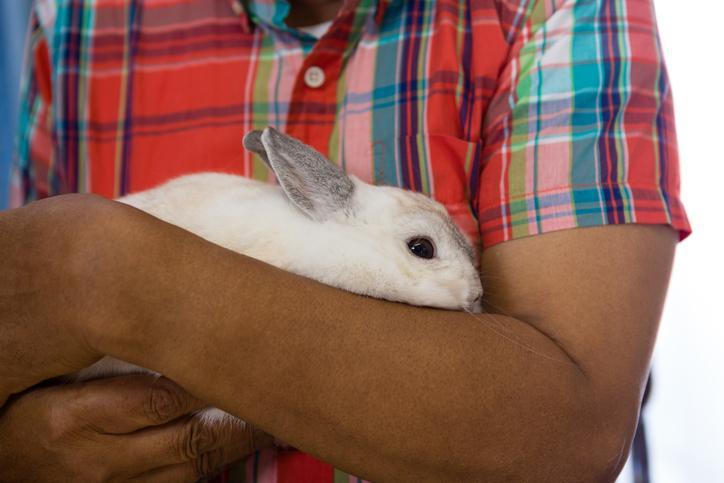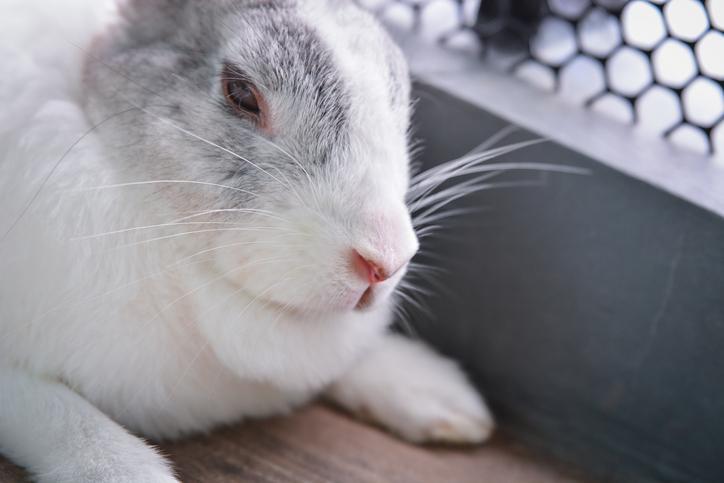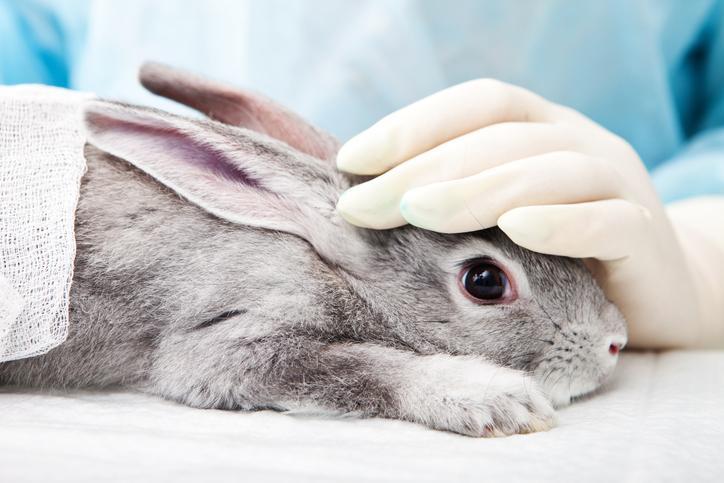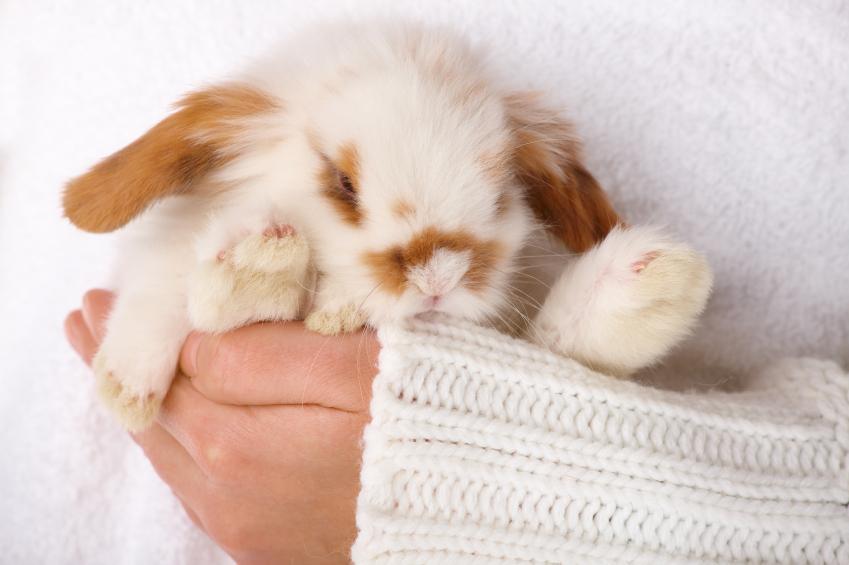Symptoms a Rabbit Is Dying

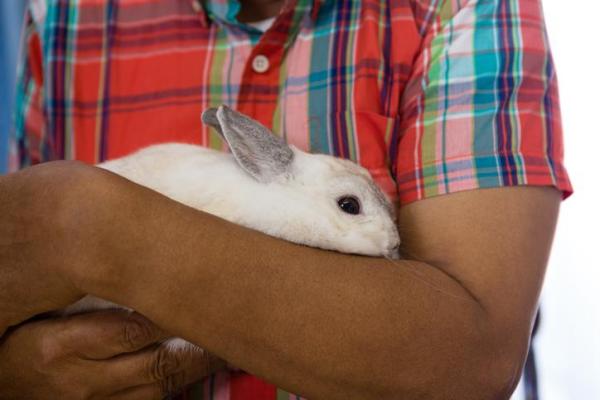

See files for Rabbits
The signs a rabbit is dying are not always obvious. It is important we know what to look out for, especially if we have a rabbit in their old age. Most of us will outlive our rabbits, but looking out for signs of illness or the last stages of life are important to ensure we either provide treatment or ensure the best quality of life during their last days. This will help us to grieve our bunny since we know we have done what we could for them.
These 5 symptoms a rabbit is dying from AnimalWised help you to provide the right care for your rabbit. This is the case whether they are in their old age and need palliative care or they have a disease which needs treatment.
- Most common causes of rabbit deaths
- They stop eating and drinking
- They do not move
- Their vital signs change
- Abnormal behavior
- The moments before death
- Signs a rabbit is dying of old age
- What to do if your rabbit is dying?
- How do I know if my rabbit is dead?
- Do rabbits die stretched out?
- Do rabbits experience seizures before they die?
- What do you do with a dead rabbit?
Most common causes of rabbit deaths
The most common causes of rabbit deaths can vary depending on factors such as the rabbit's age, living conditions and overall health. Since their living conditions are largely controlled by their guardians, the level of care we provide is of particular importance. Some of the most frequent causes of rabbit mortality include:
- Gastrointestinal stasis: this condition occurs when a rabbit's digestive system slows down or stops moving entirely. It is often caused by improper diet, lack of fiber, stress, or underlying health issues. gastrointestinal stasis can be fatal if not treated promptly.
- Dental problems: rabbits' teeth grow continuously throughout their lives, and if they do not wear down properly due to a lack of proper chewing or dental malocclusion, it can lead to severe dental problems. These issues can result in pain, difficulty eating, and eventually, death if not addressed.
- Respiratory infections: rabbits are susceptible to respiratory infections, especially if they are exposed to drafts or have inadequate living conditions. Severe respiratory infections can be life-threatening.
- Heat stroke: rabbits are sensitive to high temperatures, and heat stroke can be fatal. It is crucial to provide them with a cool and well-ventilated environment, especially during hot weather.
- Parasitic infections: parasites, such as mites, fleas, and worms, can cause significant health problems and even lead to death if left untreated.
- Viral diseases: viral infections like rabbit hemorrhagic disease (rhd) or myxomatosis can be highly contagious and fatal for rabbits.
- Trauma: accidents or injuries, such as falls, attacks from predators, or improper handling, can lead to severe injuries and death.
- Enteritis: enteritis refers to inflammation of the intestines and can be caused by various factors, including diet changes, stress, or bacterial infections. severe cases of enteritis can be life-threatening.
- Cancer: like all animals, rabbits can develop cancer, which can be fatal if not diagnosed and treated in time.
- Age-related issues: as rabbits age, they become more susceptible to various health problems associated with old age, leading to natural death.
To ensure the well-being and longevity of rabbits, it is crucial to provide them with a balanced diet, a clean and safe living environment, regular veterinary check-ups and immediate attention to any signs of illness or distress.
1. They stop eating and drinking
One of the most obvious symptoms to look for if you think your rabbit is going to die is whether they eat or drink. If your rabbit is refusing to eat hay or is struggling to drink water, it is of grave concern to their health and wellbeing.
A lack of appetite can be caused by various pathologies, both mental and physical. Scabies, dental malformations, hairball accumulation in the stomach and even stress can suppress their appetite and lead to dehydration. Rabbits need to consume sufficient amounts of hay regularly. If not, their nutritional deficit will eventually lead to death. It is also important to remember to vaccinate your rabbits to best avoid these situations occurring.
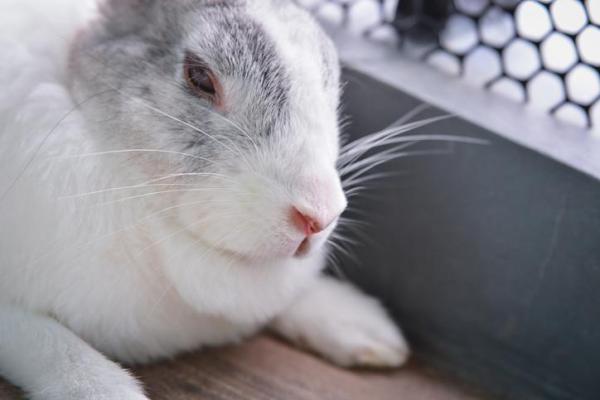
2. They do not move
Further signs that your rabbit is likely going to die are inactivity and apathy. This is something which also frequently accompanies stress in rabbits. In either case, when a rabbit's behavior changes radically, we need to be aware that something is wrong. This is especially so when they no longer engage in physical activity. If we provide a comfortable and stress-free environment, away from noise and heat, yet they don't seem to move for some reason, you should take them to the vet for evaluation.
3. Their vital signs change
When a rabbit is close to death, their vital signs will alter. Some are visible to the naked eye, such as shortness of breath. Others will require a reading, such as a lowered body temperature To know whether rabbit's vital signs have altered, we will need to take a look at the readings of vital signs in a healthy rabbit. By doing so, you can tell if there is any aberration and, therefore, a problem.
- Body temperature: usually between 38 ºC (100.4 ºF) and 40 ºC (104 ºF).
- Heart rate: oscillates between 180 and 250 beats per minute.
- Respiration: between 30 and 60 breaths per minute.
- Capillary refill time (CRT): this is an observation of how many seconds it takes for capillaries to recover their normal color once they have has pressure exerted on them. To test this on a rabbit, you can delicately press the mucosa of their gums and see if it takes longer than 2 seconds for them to resume their normal color. If we observe discoloration of the rabbit's gums, especially if they are blue, yellow or white, then we should be concerned.
When one or more of these vital signs are significantly altered, you should take your animal for veterinary consultation.
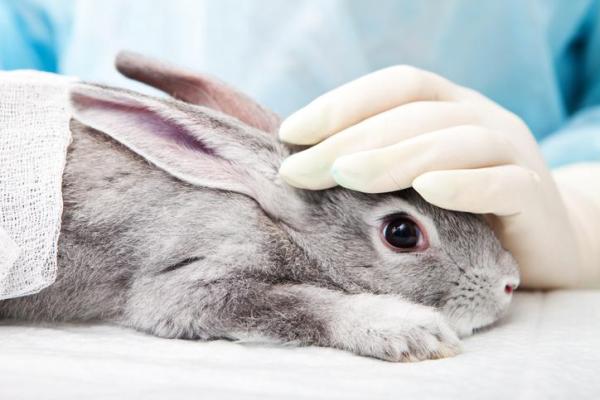
4. Abnormal behavior
Any animal close to death is likely, although not necessarily, going to exhibit some behavioral changes. This could be due to an underlying medical issue, but it could also occur due to old age. We can observe variable behavioral changes such as increased aggression or excessive fear. In the few minutes before dying, it is usual for a rabbit to release their bowels and to urinate uncontrollably. If your rabbit is in pain, they will likely not exhibit it through vocalizations, so ensure you pay close attention to other signs of pain in rabbits.
5. The moments before death
If you think your rabbit is going to die imminently, the rabbit's breathing will become altered, something known as the ‘death rattle’. The breathing will become agitated, perhaps coming and going in fits and starts, while their pulse slows. They may also develop stiffness in the jaw and experience some tremors. It is important to spend time with your rabbit at this stage, staying by their side to provide comfort in their last moments.
Signs a rabbit is dying of old age
As we have discussed above, rabbits may exhibit various signs indicating that their health is declining as they age. While individual rabbits may show different symptoms, some common signs that a rabbit may be dying of old age include:
- Decreased activity: aging rabbits may become less active and spend more time resting or lying down.
- Reduced appetite: older rabbits may show a decreased interest in food and have difficulty eating.
- Weight loss: as their appetite diminishes, older rabbits may lose weight.
- Lethargy: dying rabbits may appear weak, lethargic, and have difficulty moving.
- Difficulty breathing: respiratory issues can become more prevalent in aging rabbits, leading to labored breathing.
- Mobility issues: older rabbits may experience stiffness or difficulty moving due to arthritis or other age-related conditions.
- Fur changes: the rabbit's fur may become dull or thin as they age.
- Dental problems: dental issues are common in older rabbits, and they may have difficulty eating due to dental disease.
- Incontinence: aging rabbits may have difficulty controlling their bladder or bowels.
- Decreased grooming: older rabbits may groom themselves less often, leading to a less clean and tidy appearance.
- Behavioral changes: changes in behavior, such as increased aggression or becoming withdrawn, can be observed in some aging rabbits.
- Eye changes: cloudy or hazy eyes are common in aging rabbits.
It is crucial to seek the advice of a veterinarian who is experienced in rabbit care if you notice any of these signs or suspect that your rabbit is unwell. Regular check-ups and proactive health care can help improve the quality of life for aging rabbits.
What to do if your rabbit is dying?
It is not easy to think about the end of your rabbit's life. At the same time, it is something which should be considered and prepared for. If your rabbit is dying, it won't help them to panic. Remaining calm and doing what you can to reduce their nervousness and anxiety is imperative. Avoid loud noises, do not touch or move them excessively and avoid anything which will make the moment stressful.
The best you can do is approach the situation with gentleness and tact, petting them reassuringly to help them relax. If we feel uncomfortable ourselves or are struggling to keep it together emotionally, there is no shame in asking a trusted friend or family member to take our place in accompanying them.

How do I know if my rabbit is dead?
It can be difficult to accept the death of a beloved bunny. We may struggle to accept the fact and profess doubts they have really died, preferring to believe they have entered a state of sleepiness or have just become temporarily weak.
However, you need to recognize the signs whether your rabbit has actually died. If your rabbit is unresponsive, if they have released their bowels or if there are any of the above signs, but are still breathing, they are not dead yet. You can take them to the vet, but it is likely death is imminent, so prepare for the worst.
Do rabbits die stretched out?
You may have seen a rabbit has died stretched out. Rabbits can die in various positions and it's not necessarily limited to being stretched out. When a rabbit dies, it may assume a relaxed or stretched-out position due to the muscles relaxing after death. However, the position in which a rabbit dies can depend on the circumstances surrounding its passing.
If a rabbit dies naturally or peacefully, it might appear in a more relaxed posture with its body stretched out. On the other hand, if a rabbit experiences distress or suffers from an illness or injury before death, it may not be in a typical resting position when it passes away.
It's essential to remember that rabbits, like all living creatures, have different experiences in life and death. If you have a pet rabbit, ensuring it lives in a safe and healthy environment, providing appropriate care, and seeking veterinary attention if it shows signs of illness are crucial to promoting a happy and long life.
Do rabbits experience seizures before they die?
As with other animals, rabbits can experience seizures. These are sudden, uncontrolled electrical disturbances in the brain. Seizures in rabbits may be caused by various factors, including underlying medical conditions, toxins, infections, or neurological issues. However, experiencing a seizure does not necessarily mean that a rabbit is close to death.
In some cases, a seizure may be a symptom of a serious health problem and immediate veterinary attention is required to diagnose and treat the underlying cause. Seizures can be distressing for both the rabbit and the owner, so it's crucial to seek professional veterinary care to determine the appropriate course of action.
If you observe any unusual behaviors or signs of distress in your rabbit, including seizures, it is essential to contact a veterinarian with experience in treating rabbits as soon as possible. Early intervention and proper medical care can improve the chances of a positive outcome for your furry friend.
Learn more with our article on what to do when your rabbit is having a seizure.

What do you do with a dead rabbit?
The death of a rabbit is a painful process, but you should understand that it is also a natural one. After death, you may be worried about the practical concerns of what to do with the rabbit's body. There are resources available to take care of them. If you contact your vet, they should have access to an incinerator to burn the remains. If they do not, they should provide information about what services are available. Pet funeral services are available in some areas, but it is up to you whether you want to spend money on something which might end up being expensive.
It is important to know that you should never simply put a dead rabbit's body in the trash. This can cause the spread of diseases and parasites to the environment. It can also encourage animals to root through your trash. You can bury the animal as long as it is on property you own. You cannot dig up public space and bury your animal without permission. If you rent property, similar considerations need to be made. Be careful if you have dogs or other animals with access to the burial site as they may be inclined to dig up the body.
Finally, it is important to consider the emotional ramifications of experiencing the loss of a pet. You will likely have a period of mourning, but you should feel free to express your grief and sadness in healthy ways. These experiences are also good learning experiences for younger children who are starting to come to grips with the impermanence of life.

If you want to read similar articles to Symptoms a Rabbit Is Dying, we recommend you visit our Geriatrics category.





